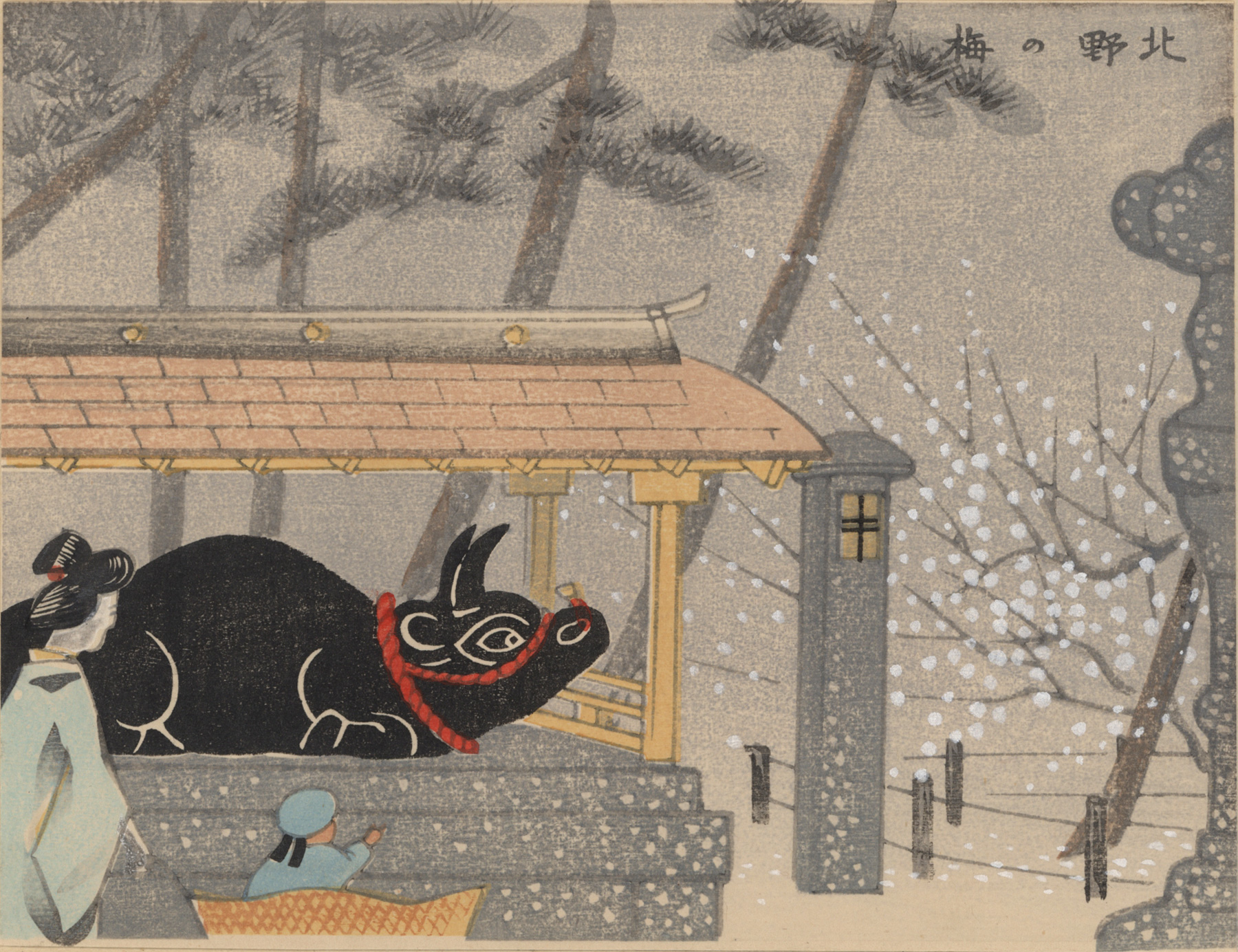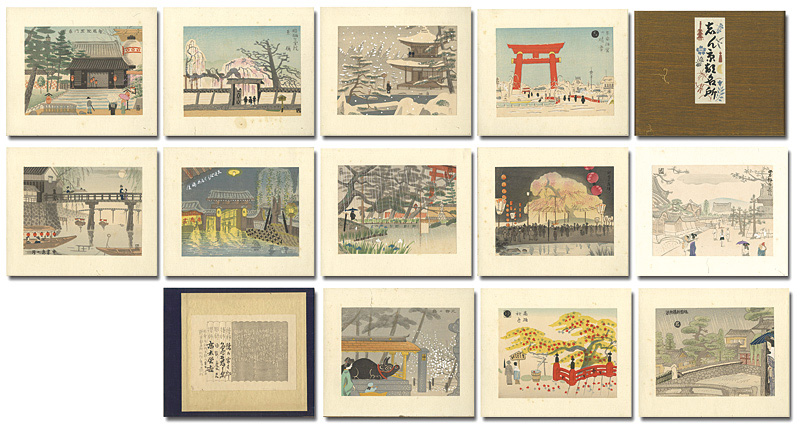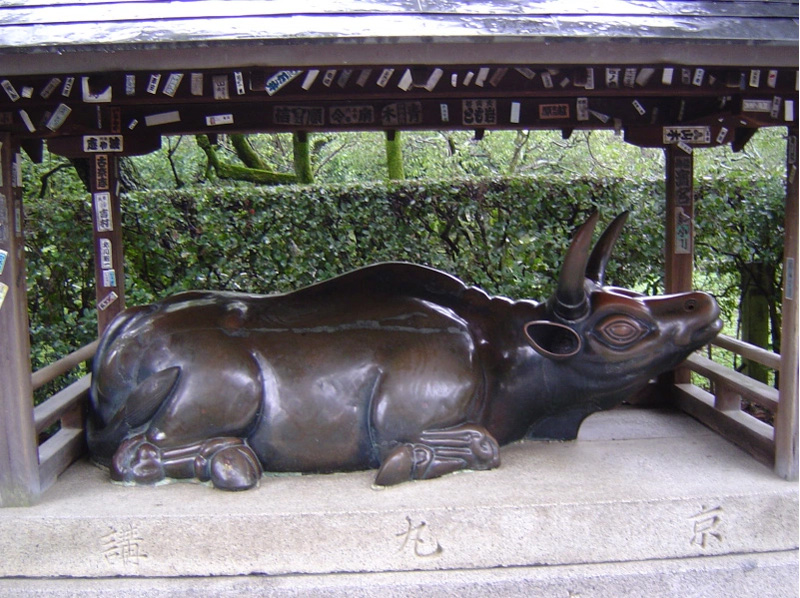About This Print
One of twelve small-size prints (approx. 5 x 6.5 in.) from the portfolio titled New Famous Places of Kyoto (志ん京都名所 Shin Kyōto meisho), designed by the artists Kamei Tōbei (1901-1977) and Tokuriki Tomikichirō (1902-2000)*, and published by the New Famous Places of Kyoto Publication Society (新京都名所刊行会).
The two artists often collaborated and the publishing entity New Famous Places of Kyoto Publication Society, is likely a construct of the two artists.
In this print, a woman, pushing her young son in a stroller, passes by one of the many statues of reclining cows at Kyoto's Kitano Tenmangū Shrine, dedicated to the spirit of the exiled scholar and poet Sugawara no Michizane. The young boy is pointing to the cow, which visitors seeking good fortune in their scholarly pursuits often stroke as they pass by. (See below to find out why cows are associated with Michizane.) The temple is known for its famous plum trees that bloom from late February throughout March.
* It is unclear if Tokuriki actually designed any of the prints themselves as all the prints either carry some version of Kamei's artist seal or are not signed or sealed.
The Complete Portfolio
Six or more of the print designs in this portfolio seem to have also been issued at another time, possibly printed using different blocks. The website of The Agency of Cultural Affairs - Cultural Heritage Online contains six of these prints, with each print visibly different from the prints in this collection. As with this collection's prints, their prints are not dated, but they attribute the prints to Kamei Genbei, a name used by Kamei after 1953, which helps narrow the publication dates to post-1953.
1 Website of Kyoto University of Foreign Studies "Learning About Kyoto" http://www.kyopro.kufs.ac.jp/dp/dp01.nsf/ecfa8fdd6a53a7fc4925700e00303ed8/d554aa921fbd4fec49256f9000214d80!OpenDocument
One of many Nade ushi (petting cows) on the grounds
Kitano Tenmangū
Source: website of Japan Visitor https://www.japanvisitor.com/japan-temples-shrines/kitano-tenmangu-shrineKitano-Tenman-gu Shrine, which sits on the edge of the picturesque Kamishichiken Geisha District, is a large Shinto shrine "built in 947 in honor of poet and scholar Sugawara no Michizane (845-903), an advisor to the emperors Uda and Daigo, who fell out of favor with the ruling Fujiwara clan and was exiled to Dazaifu in Kyushu, where he died.
"Kitano Tenmangu was built to appease the scholar's supposedly angry spirit, following an outbreak of plague in the Kyoto and various misfortunes including thunderstorms and earthquakes that struck the capital and imperial family following Sugawara no Michizane's death.
"Sugawara became deified as Tenjin, a deity of scholarship. There are now thousands of shrines, large and small, dedicated to Tenjin throughout the country, somewhere in the 10-20,000 range. Previously the Tenjin Shrine was dedicated to the god of thunder and the angry spirit of Sugawara no Michizane was thought to be manifested in the thunderstorms that hit Kyoto.
"Students undergoing the annual "examination hell" visit the shrine throughout the year but especially in winter to pray for success and buy one of the shrines lucky charms, ema (votive plaques) or omamori."
There are many stories about the relationship of Michizane to cows. Some talk about his being born in the year of the ox or place the time of his death on the day and month of the ox, or that the cows wept when he was exiled to Dazaifu , but the one I like the best relates how the shrine honors the cow that collapsed and died while pulling Michizane's corpse.
Print Details
| IHL Catalog | #2195 |
| Title | Plum Tree at Kitano Tenmangū Shrine Kitano no ume 北野の梅 |
| Series | New Famous Places of Kyoto 志ん京都名所 |
| Artist | Kamei Tōbei (1901-1977) |
| Signature | not signed |
| Seal | not sealed |
| Date | after 1953 |
| Edition | unknown |
| Publisher | 新京都名所刊行会 New Famous Places of Kyoto Publication Society |
| Impression | excellent |
| Colors | excellent |
| Condition | excellent |
| Genre | sosaku hanga (creative print) |
| Miscellaneous | |
| Format | yotsugiri |
| H x W Paper and Image H x w backing paper | 4 7/8 x 6 7/16 in. (12.4 x 16.4 cm) 7 1/16 x 8 1/4 in. (17.9 x 21 cm) |
| Collections This Print | |
| Reference Literature |
last update:
created 10/13/2019




